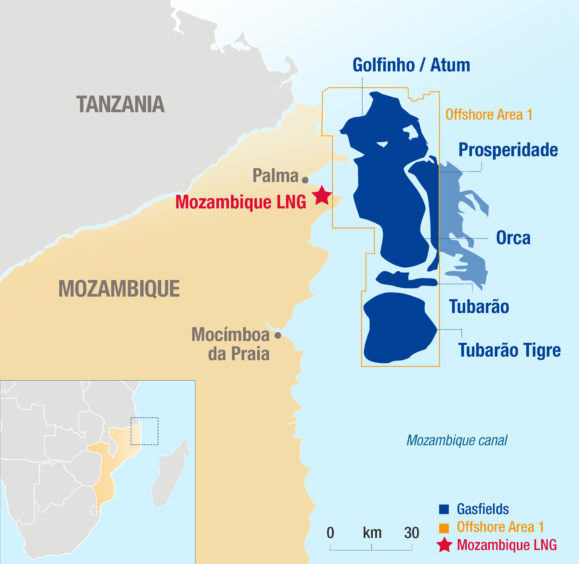
The insurgency in northern Mozambique is becoming more dangerous, causing alarm for the two major gas projects in the area. There is little sign of improvement.
There has been a “dramatic increase of brutal attacks by armed groups over the past few months”, the United Nations Refugee Agency’s spokesman Andrej Mahecic said today at a press briefing in Geneva. There have been 28 attacks since the start of the year, he said, and have taken place in nine of the northern Cabo Delgado province’s 16 districts.
ExxonMobil and Total were recently reported to have asked the Mozambique government for more military support. The energy companies have, thus far, been largely immune from the violence. There has been some pressure on logistics companies and an attack on a convoy in February 2019 led to the death of one worker, with another six injured.
The Ahlu Sunna Wal Jamaa (ASWJ) group emerged in 2014 and has become increasingly active since 2017.
The province has been neglected for many years, a researcher at the German Institute for International and Security Affair Melanie Mueller told Energy Voice. There is a perception that the locals have been excluded from the benefits of natural resources, such as offshore gas fields and mining.
The relocation of local people, to the benefit of international companies, “creates an environment where groups – wherever they come from – can recruit people, particularly the young where unemployment is high”, Mueller said.
Vengeance
The resettlement process was flawed, EC Associates’ Empowering Communication president Greg Pirio said. Moving people from their land was “poorly implemented” and helped to play a part in creating “local tensions and conflict”. Reports have suggested that some of those arrested criticised the gas projects.
Pirio said the theme of vengeance was a common one in recruiting for jihadism. The origins of the movement are somewhat obscured, in part because of government restrictions on the province.
Stratfor’s sub-Saharan Africa analyst Stephen Rakowski said it was unlikely there was a link to Somalia’s al-Shabaab group. Islamic State (IS) has claimed responsibility for attacks in Mozambique, with Rakowski saying this too was unclear with the statement possibly motivated by an attempt to gain attention.
The first recruits to the ASWJ cause came from the Gemfields ruby mines, Pirio said, noting reports of torture and killing of artisan miners.
The ruby mining company settled a legal claim in January 2019 with a group of Mozambicans, in response to human rights abuse claims. Gemfields denied liability for the actions but said that, in the past, there had been “instances of violence” on its licence area.
One of the challenges in responding to the insurgency is its distance. Cabo Delgado’s main city, Pemba, “is further from Maputo, the Mozambican capital, than Windhoek, Namibia, on the other side of the continent”, Rakowski commented. “We are talking thousands of kilometres for a poor, underfunded and overstretched military. In addition, the government has clamped down on media dissemination and the violent nature of the conflict has kept journalists away from the zone.”
The shroud of secrecy the government has drawn over the area has also allowed it to attribute some of its more questionable actions to its struggle against ASWJ. South African businessman Andre Hanekom owned a logistics company in the province and was arrested in August 2018, during which he was shot.
He was denied access to lawyers or his family and was reported to have died in January 2019. The month before he died, the authorities charged him with various crimes, including murder and said he was a leader of ASWJ. Hanekom’s wife has denied the charges.
The insurgency is gaining ground and increasing its area of operations to the south, Pirio continued, closer to Pemba. The UN has said attacks have been reported 100 km from the city.
Internally displaced people have gathered in Pemba. “It’s a disaster for the local population, with tens of thousands of internally displaced people, while climate change and flooding are also contributing to food shortages,” he continued. Those fleeing violence often cannot take possessions with them, putting pressure on areas they move to and sparking concerns of food shortages and the spread of illnesses.
Response
The government was taken off guard by the northern insurgency, Rakowski said, saying it had been more focused on Renamo in the central provinces.
In addition to limiting the flow of information from Cabo Delgado, the government of Mozambique has also hired Russia’s Wagner mercenary group. Reports suggest the group, which has high-level political links in Moscow, is struggling to make progress.
SWP’s Mueller called for lessons to be learned from other conflicts, such as in the Sahel. “If the government tries to counter with violence, there’s a risk of the insurgency movement spreading,” she commented.
In order to tackle the problem, economic stability and inclusive development will go some way to reducing the insurgency. “The state needs to talk to the groups on the ground and create employment for young people. More information is needed on the movement, about who is driving it and whether moderates can be won back by the government. It is a situation that cannot change overnight.”
The UN has set out plans to deploy more staff and resources to meet local needs. Initially, it aims to provide support for 15,000 people, with a commitment of $2 million.
“As Exxon and Total requesting more government troops underscores: they are focused on guarding their installations while the government struggles to take a hard look at the drivers of the conflict,” said Stratfor’s Rakowski.
International support to tackle ASWJ is also needed, given Mozambique’s limited capacity. The country is one of the poorest in the world and is struggling with the fallout of a debt scandal.
Mueller said there may be a role for South Africa or the South African Development Community (SADC) to help Mozambique’s efforts. “Without intervention, though, Mozambique could be an entry point for more radicalisation.”
